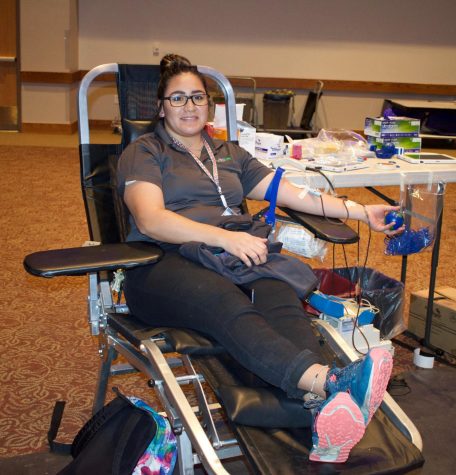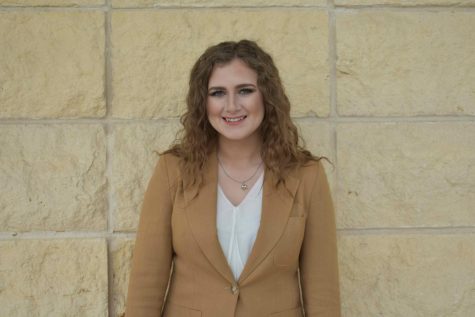A little stick is worth saving a life
January 28, 2019

An ambulance arrives at the scene, chaos fills the air and it seems that all hope is gone for the individual who just suffered this tragic accident. The emergency medical team swiftly accomplishes their objective and begins to transfuse the patient with a unit of blood that will save their life. Unfortunately, blood is not always at the disposal of our medical teams. Humans are the only source for this most precious commodity. Whether it is a traumatic injury or a patient suffering from cancer, there is always a need for blood donations.
Various organizations at West Texas A&M University rise to this need by hosting several blood drives on campus. Chari Hill, assistant director of the student center and a member of the Blood Council Committee at WTAMU has helped organize several blood drives over the years.
“I’ve been on the blood council committee here on campus for many years, and the JBK started sponsoring the Blood Drive in January several years ago,” Hill said. “We have several blood drives on campus during the year, we just have to find the space to put them. Our biggest drive is in October hosted by the student government.”
Lamar Scalise, the donor room senior supervisor for the WTAMU drive oversees the blood drives from start to finish. Like Hill, Scalise keeps things running smoothly during the drive. Scalise encourages potential donors to reach out with any concerns or questions prior to the event.
“On our website, there is a donor express and they can go on there and fill out the questions and read the education materials before coming in to donate. If there are any questions about qualifications they can always call the center and ask to speak with someone,” said Scalise. “It can take an hour from start to finish. That’s from answering the questions to having a snack. Photo ID is required and we recommend that at they eat and drink well. Plenty of fluids and plenty to eat before coming to donate.”
The Coffee Memorial Blood Center serves 31 counties and 29 medical facilities in the High Plains Region. When asked about the importance of donating at local drives, Scalise stressed the impact that the donations directly had on our Amarillo area.
“The blood donated here today will primarily serve the Amarillo area. They are the priority and then we will ship out to other areas.”
Yesenia Gutierrez, a junior studying animal science at WTAMU has donated and attended 4 blood drives and encourages her fellow students to push past their reservations and donate as well.
“I would just encourage people to do it, even if they think they are afraid of needles maybe bring a friend with you so you don’t feel really scared,” said Gutierrez. “I think it is just more of a mental thing rather than something that you can’t physically do.”
Gutierrez assures that the process is very “simple” and the staff will assist you with anything you may need.
“It’s very simple, when you walk in be prepared to answer some questions, they will do a finger prick test before they actually take your blood. It’s a very simple process and they walk you through it. Today, there were people with me throughout the entire process.”
While some students like Gutierrez are frequent donors, Hill suggests that it is getting more challenging to increase participation with the on-campus drives.
“There actually seems to be less involvement. We’ve been working with the blood center the past couple years to get the numbers back up and get more advertising out to the students, faculty, and staff,” said Hill. “The blood drive always offers some sort of t-shirt for the donors and whoever the campus sponsor is tries to throw in something for the donors as well. We always do the $25 buff cash each day, but in to addition to that, the Blood Center got some Pak-A-Sak cards for $10.”
Many of the recipients of the donated blood have expressed their appreciation by submitting letters and photos to the website thankthedonor.org. This website allows for recipients to directly thank their donor. This is all the incentive necessary for Gutierrez to give her time.
“The t-shirt is just an added benefit. I would donate anyway but the free t-shirt is an added plus,” said Gutierrez. “I just know that there are people who need it. If a family member of mine or myself needed it one day I would hope there would be some available for me.”
No matter the reason someone chooses to donate, there is no denying the selfless act of human kindness that these donors exhibit. The Amarillo area needs approximately 30,000 units of blood each year to meet the needs of suffering individuals. The next WTAMU campus blood drive will be hosted by the Residential Hall Association (RHA) on April 22-24 in Legacy Hall. Hill encourages more people to attend the April blood drive and take the time to help save a life.
“I’ve donated somewhere around 51 units in my life time. If you’re scared of needles just don’t watch. It doesn’t hurt that bad. I just feel like it’s something that I can do for somebody else. It doesn’t take much time and it doesn’t cost any money to save a life. It’s worth it to me to have a little stick.”



